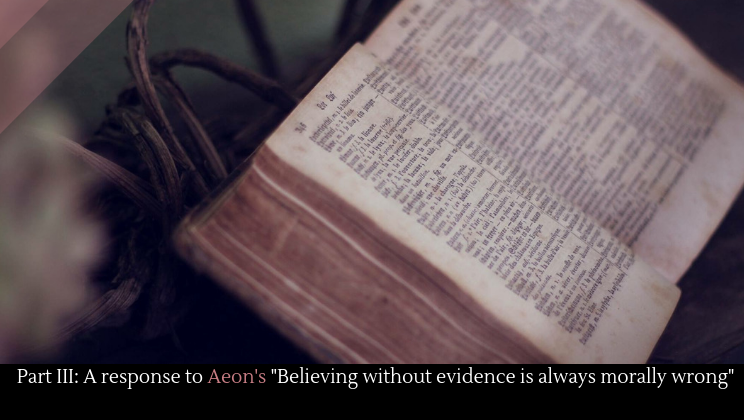Part III: A response to Aeon’s “Believing without evidence is always morally wrong”
Posted by Josh Taylor / November 13, 2018
In the previous section, I claimed that Francisco Mejia Uribe’s argument that we need to think more critically about news sources was a good but based on terrible evidence: William Kingdon Clifford’s essay”The Ethics of Belief.” I demonstrated that Clifford’s essay was entangled with anti-Catholic bias and rooted in Protestant ideas about the nature of humanity and human action. As a result, Uribe’s evidence actually undermines his argument.
To recap, Clifford’s problem with belief was the result of his own cultural conditions. His essay unwillingly perpetuated the assumptions underlying those conditions, namely, that belief precedes action. With that as a foundation, Clifford claimed that bad belief will lead to bad action. Uribe applies that to the modern period to claim that we need to be careful about what we read because that leads to bad beliefs, which in turn lead to bad actions. But the problem is this: belief does not always, or even most of the time, lead to action. In the case of both Clifford and Uribe’s arguments, it’s actually the opposite––action causes belief.
We have all experienced the way that actions cause beliefs. Think about time you were asked to define your political or religious beliefs, especially when you were younger. Despite all of your reading and thinking about issues, you probably noticed that it took practice to put all that data together into a coherent system. It might even have taken years of practices and scores of conversation. The act of speaking (or writing) brought your ideas into the world, rendered them concrete, and in turn gave you the opportunity to shape your belief system. You may have noticed a similar phenomenon when you’ve been angry about something someone did and then expressed that anger. Your thoughts about the inciting incident may have been intense, but it wasn’t until you spoke to that person and voiced your thoughts that they became real, and as a result your anger got more intense. As you act on your thoughts, they become realer, more significant, and more influential in shaping future beliefs and actions.
Philosopher Pierre Bourdieu has suggested that the physical actions we perform throughout our lives become “a permanent disposition, a durable manner of standing, speaking, and thereby of feeling and thinking (Bourdieu, The Logic of Practice, 1977:94).” In other words, Bourdieu claimed that we take internalize our social worlds––including ideas about politics and religion––but they do not become solidified in the mind until we act them out. Merely reading about liberal politics is not enough to make one liberal––but the act of seeking out liberal news sources, sharing progressive memes, discussing liberal ideas, and voting for liberal candidates all work together to shape someone’s way of thinking.
To bring the point back to Clifford and Uribe, the content of “fake news” is not the exact cause of bad beliefs. By the time the content is in any way significant to a person, it’s already too late. Their behaviors––clicking links for fake news, sharing fake news, talking about bogus conspiracy theories as though they are real, and so on––have made them susceptible to the content. On a more societal scale, the exact content is hardly as significant as the overall pattern of behavior. Imagine tens or hundreds of thousands of people reading, sharing, and talking about bad information. They may not be dealing with the same bad information, but their actions share in common an intellectual docility, a willingness to read and live uncritically. That willingness––a willingness they act out and thus prove on a daily basis––is for more important than whatever they “believe” because willingness can be channeled and exploited.
Although I disagree with his method and his data, Uribe’s point stands: fake news is a problem. But attributing that problem entirely to “belief without evidence” is a mistake. Not only for the reasons mentioned above––that belief comes from action, not vice versa––but also because his argument takes the onus off for profit news and sharing sources. Facebook, Twitter, CNN, Fox, etc. all make money not only off the content flowing through them, but through users’ actions––their clicks and shares.
Yes, it is the reader’s responsibility to read cautiously and exercise discretion. But we must also consider the possibility that these news sites should limit users’ possible actions. For example, perhaps news and social media sites limit news sharing to verified sites. Or perhaps any link that crosses the site should be run through a basic filter. I’m not suggesting this is what must or even should be done, but that we cannot rely on users critical thinking abilities to stop the spread of harmful conspiracies and fake news because critical thinking is not the issue––action is the issue. If users are reading and sharing bad content, then it’s likely too late to rely on critical thinking to stop the spread of that bad content.
More about news.
Ah, religion. Are people really still talking about it after all these years? So dreadfully boring! Do people not have any interesting hobbies anymore?